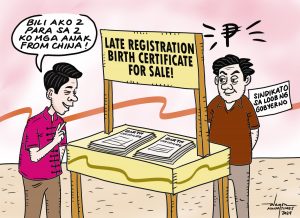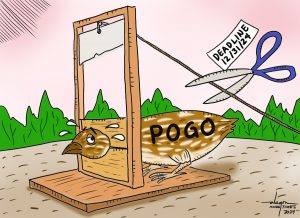KIDAPAWAN CITY (MindaNews) – My resolve in people’s lawyering was greatly put to test when policemen herded and charged about a hundred farmers of direct assault, including elderly men and women, as a result of the violent dispersal of thousands of protesters in the morning of April 1, 2016 at the Cotabato-Davao national highway. The protesters, mostly poor farmers from Kidapawan City and municipalities of Arakan, Magpet and Antipas, were demanding rice distribution from government authorities after a long dry spell affecting their farms.
The incident had caused the death of one farmer-protester and one bystander from bullet wounds and serious injuries to many farmers as well as members of the police dispersal team.
Except for the two medical workers from Arakan Parish, who were asked to respond and give first aid to the wounded but arrived only after the dispersal incident, my poor farmer-clients said that they joined the protest-rally because they were told that there will be rice distribution. The men and women were brought to the gym and women center, respectively, as part of what the police called “a rescue operation”. They were also promised medical assistance and food when the police “rescued” them at the houses and construction bunkers at the vicinity of the national highway.
However, despite their plea and explanation that they did not join the barricade for the reason that they were not part of the protesters (medical workers) or due to their age and fragile health conditions (elderly men and women), they were still charged of direct assault. The case was filed on April 3 or 4, 2016, or about 2 or 3 days after the incident.
Nonetheless, hearings of the cases are still pending before the Municipal Trial Court in Cities (MTCC) of Kidapawan City as of this writing.
From then on, I continue to receive a deluge of cases involving farmers, indigenous peoples, and church workers, who have been charged of ordinary crimes, mostly non-bailable offenses. Understanding, however, the context the work and involvement of these community leaders, they are clearly victims of vilifications and perceived supporters or sympathizers of communist rebels. Many if not all are trumped up charges.
Frankly, taking this line of legal practice is not only daunting but risky, thankless and financially unrewarding. When I shared these principles to one of my local colleagues, I was shocked of his response, “You cannot eat your principles”. Well, he may have forgotten his oath as a lawyer after many years of receiving financial rewards and accolades. His is the same dangerous view swamping the legal profession that Justice Leonen abhors. Appallingly, it is still in the mindset of many lawyers who are already in their retirement or twilight years. It is a clear manifestation of failure in the legal ethics which many in the legal profession consider as a mere bar subject and insignificant in actual practice.
Like in the urban areas, many forms of injustices are also taking place in the barrios – in the communities where the struggling peasants, farmers and indigenous peoples dwell. In fact, they are the usual victims of armed conflict between government forces and rebels which often led to economic displacement, physical harm and trumped up crimes.Lawyers who are willing to embrace the principles of truth, peace, social justice and human rights are much needed here. Will you take the challenge?
[MindaViews is the opinion section of MindaNews. Upper Right Hand is a revolving column of the Union of People’s Lawyers in Mindanao (UPLM). Atty. Dionesio T. Alave Jr. is the Chair of People’s Peace Network, an alliance of local church and civil society organizations in Kidapawan City which is actively involved in peacebuilding and promotion of justice and human rights. He has been a rural development worker since 1994 and human rights lawyer upon admission to the bar in 2012.]


